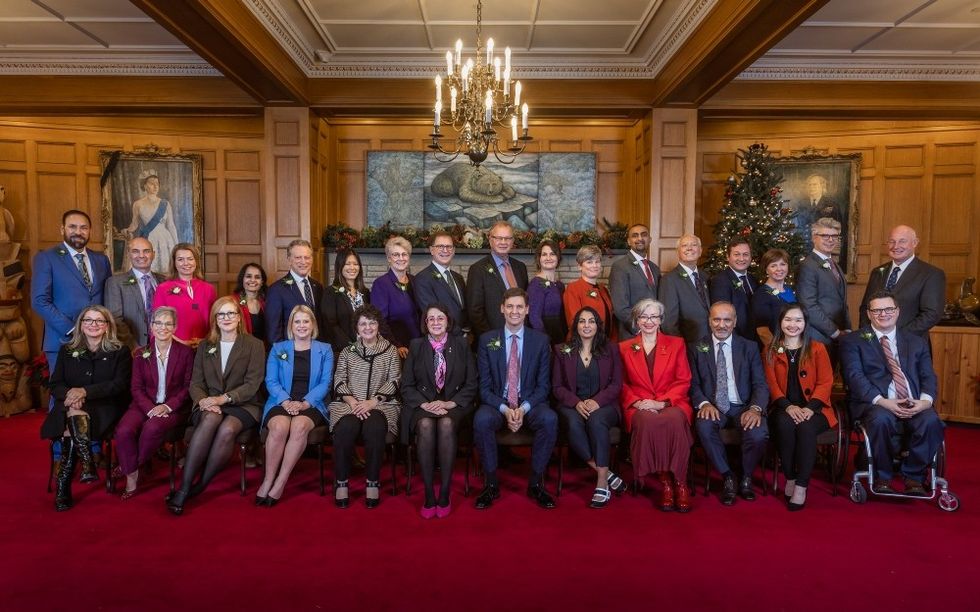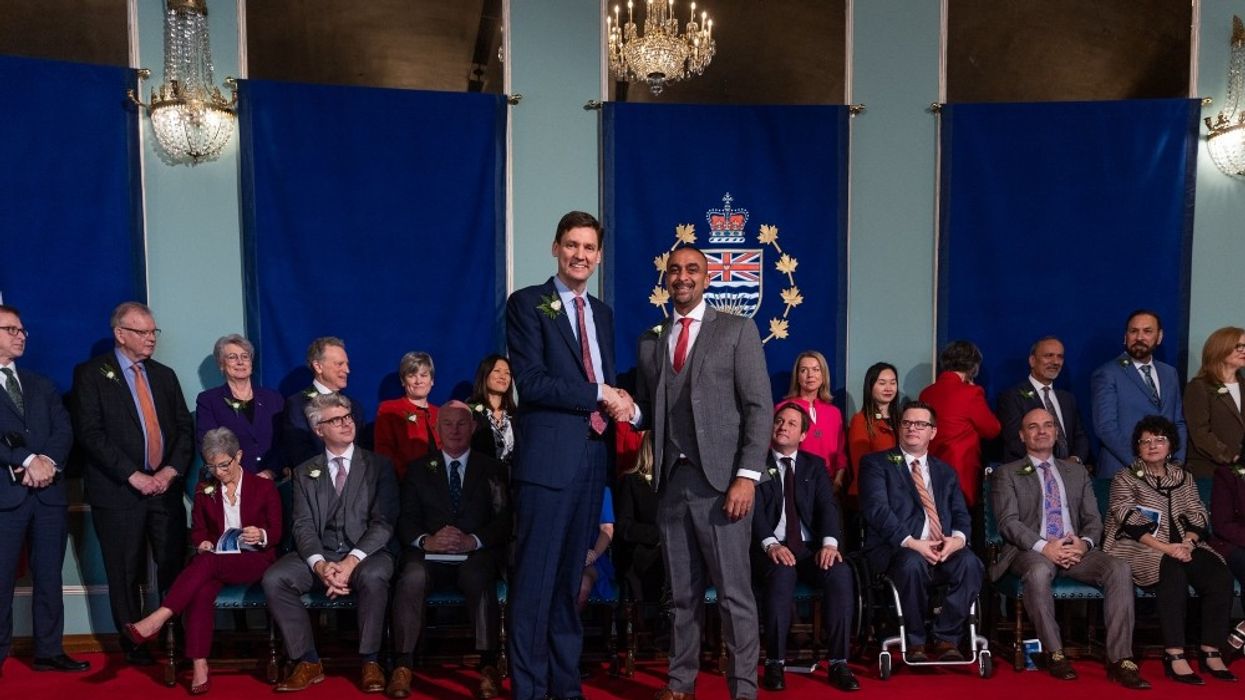On Wednesday, BC Premier David Eby announced and swore in his cabinet, naming Ravi Kahlon -- previously the Minister of Jobs, Economic Recovery and Innovation -- as the new Minister of Housing, which Eby is making a standalone ministry.
The housing portfolio has historically been taken on by other ministers. Eby himself acted as the Minister responsible Housing while simultaneously serving as Attorney General. After stepping down from both positions earlier this year to run for NDP Leader, Murray Rankin filled both positions, along with acting as the Minister of Indigenous Relations and Reconciliation. Rankin will now focus solely on the latter.
Eby announced in late-November that he would be creating a dedicated housing ministry, saying that "the housing crisis deserves the attention of a full ministry and the resources that come with it." Teri Collins will serve as the Deputy Minister of Housing and Eby has since also announced that he is assigning Kahlon a Parliamentary Secretary for Rural Development to assist him.
In a mandate letter this week, Eby laid out his desired goals for Kahlon, many of which are carryovers from the housing platform Eby outlined amidst his campaign to become NDP Leader. Those include asking Kahlon to:
- Establish BC Builds to build housing for middle-income families, individuals, and seniors;
- Ensure timely resolution of landlord/tenant disputes;
- With support from the Minister of Finance, establish a rental housing acquisition fund;
- Introduce legislation establishing new tools for local governments to help them better regulate short term rentals in their communities;
- Introduce laws to legalize secondary suites province-wide and expand the number of units allowed to be built in cities using single-family home development permit processes;
- Introduce an effective flipping tax to fight increased costs caused by short-term flipping by investors;
- Work with Indigenous partners to identify and deliver on Indigenous housing priorities for the province;
- Simplify and speed up provincial housing approval processes, working toward 'one-stop' provincial permitting -- and support municipalities to streamline development approvals through the continued implementation of the Development Approvals Process Review;
- Expand on the new homelessness supports launched in Budget 2022, including long-term housing to address encampments;
- Support the Minister of Transportation and Infrastructure to implement transit-oriented development to advance sustainable communities along transit corridors to help achieve our housing and affordability goals, including targets for non-market units and non-profit housing; and
- Lead government’s work to better coordinate services to deliver improved outcomes for people living in Vancouver’s Downtown Eastside.
Additionally, Eby also tasked Ravi Kahlon with implementing the Housing Supply Act that Eby announced in November. The Act gives the provincial government the authority to set housing targets in municipalities and includes "compliance options" as "a last resort" in the case that municipalities struggle to meet those targets.
READ: Premier David Eby Announces Housing Supply and Strata Property Acts
"Few issues are as central to our government’s goal of ensuring British Columbia is a place where everyone can make a home as the need for housing itself," Eby wrote in the mandate letter. "Our province is growing quickly -- 100,000 people moved here last year, setting a 50-year record. This year, we expect similar growth. Coupled with seniors looking for affordable homes, young people looking to leave their parents' home and start life independently, and people moving to smaller communities to work remotely, demand for housing has never been higher in our province -- and supply is not keeping up."
"While expanding our work to build housing for those living in the parks and on the sidewalks in our communities, we must take strong steps to get involved in delivering attainable middle-class housing for families who call our province home, for those who want to call our province home, for the people who make our province run every day, and for the seniors who helped build our province. We will face challenges in this work, but people expect us to do even more, and we must deliver for them."
David Eby's New Cabinet

On Wednesday Eby also named Bowinn Ma as the Ministry of Emergency Management and Climate Readiness, the second new ministry Eby has created, with Eby tasking her with coordinating and leading "the cross-government work needed to learn from, respond to, and prepare for emergencies." Eby is also assigning her a Parliamentary Secretary for Emergency Preparedness to assist her.
The full cabinet is as follows:
- Premier: David Eby
- Agriculture and Food: Pam Alexis
- Attorney General: Niki Sharma
- Children and Family Development: Mitzi Dean
- Citizens’ Services: Lisa Beare
- Education and Child Care: Rachna Singh
- Emergency Management and Climate Readiness: Bowinn Ma
- Energy, Mines and Low Carbon Innovation: Josie Osborne
- Environment and Climate Change Strategy: George Heyman
- Finance (includes Columbia River Treaty): Katrine Conroy
- Forests, and Minister Responsible for Consular Corps: Bruce Ralston
- Health, and Minister Responsible for Francophone Affairs: Adrian Dix
- Housing, and Government House Leader: Ravi Kahlon
- Indigenous Relations and Reconciliation: Murray Rankin
- Jobs, Economic Development and Innovation: Brenda Bailey
- Labour: Harry Bains
- Mental Health and Addictions: Jennifer Whiteside
- Municipal Affairs: Anne Kang
- Post-Secondary Education and Future Skills: Selina Robinson
- Public Safety and Solicitor General (ICBC), and Deputy Premier: Mike Farnworth
- Social Development and Poverty Reduction: Sheila Malcolmson
- Tourism, Arts, Culture and Sport: Lana Popham
- Transportation and Infrastructure (BC Transit and Translink): Rob Fleming
- Water, Land and Resource Stewardship (Fisheries): Nathan Cullen
Along with the 23 cabinet ministers, four ministers of state were also named, including Grace Lore as Minister of State for Child Care, Jagrup Brar as Minister of State for Trade, Andrew Mercier as Minister of State for Workplace Development, and Dan Coulter as the Minister of State for Infrastructure and Transit.
"British Columbia is a wonderful place to live, but people are looking for action on the issues facing them and their families," Eby said on Wednesday. "If the pandemic taught us anything, it's that we can't solve these problems alone. We need to solve them together. My team of determined colleagues will use a wealth and variety of experiences to continue the good work we’ve started and go further to deliver results people can see and feel in their communities."





















